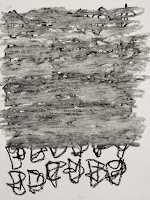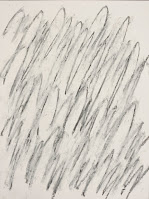Saturday, February 20, 2021
Nine drawings
Friday, February 12, 2021
Art Doesn't Make the Artist
“I can't always relate to your work, but I can always relate to you, and that is what mattered.”
This quote is from someone who is a former coworker of mine that I still stay in touch with. We both worked for a long time at a food retail job in Philadelphia as managers. The business switched hands a couple of times after the original owner retired. I didn't last past the second changeover, but Kerry P. did, although he eventually left there, as well. Kerry is someone who will say what is on his mind and is pretty open with people. It's one of the things I like about him.
The above quote is from an email exchange we had not long ago. What he said here has really stuck with me because of its honesty. What I make as an artist isn't going to appeal to everyone and there's nothing new about that, it's a simple truth of life, in general. I don't really worry about who will like/dislike my work. I'm more concerned with making it and having it out in the world to be experienced. I guess what it brings up for me is the importance of interpersonal relationships and how we navigate them as artists. What I'm trying to get at is that, deep down, we want a response to our work. If that happens, good or bad, then I think most of us will be satisfied. How we handle those reactions is also key. I wasn't surprised by Kerry's pronouncement of not being able to relate to what I do, since he has said in the past that he has a limited understanding of contemporary art.
This part, "...but I can always relate to you, and that is what mattered.", is key. It brought home the thought that what we do isn't all that we are. Art has always been a MAJOR part of my life, but just one part, not all of it. I live, breath and eat art, but it isn't the only thing that makes up who I am as a person. I've always felt this way. Often, I think that people can tend to subsume their entire personalities and motivations into what they see as the one thing that makes them who they are. While I believe there is no separation between art and life, art isn't all of life. There are so many other factors that go into what makes up who we are. Much of that has to do with perceptions of us from others. Our personalities and beliefs are made up of our own experiences, how other people experience/perceive us, as well as our own perceptions of the world and others.
I think I could have easily taken offense to Kerry's remark, saying something like, "What do you mean, you can't relate to my art but you can relate to me? Isn't my art part of me?" and so on. However, that wasn't the case. I accepted his comment because that's his truth, plain and simple. He relates to me as a person from a certain part of his life (work, mostly) and he's had difficulty relating to some of my artwork. It doesn't negate my whole being as a person, if anything, it can open up a path for further discussion about my work and his relationship to it. It's easy to conflate our main occupation with the entirety of our self worth, but in the end, there's way more to us than what we think we know through our work.
TM
Shockoe Artspeak and the enduring myth of the "starving artist"
Saturday, February 06, 2021
Commitment: Fuel for the Marathon











